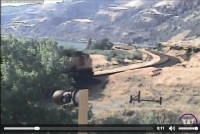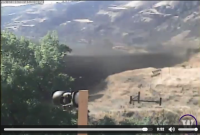Scientific research by UW confirms coal trains are bad for breathing. Read more about the train study and peer-reviewed article, "Diesel particulate matter and coal dust from trains in the Columbia River Gorge, Washington State, USA."


- The University of Washington research team found an increase in fine dust and sometimes larger particles when coal trains passed. Regarding the trains the researchers called "super-dusters, the peer-reviewed paper stated: "There is a significant increase in large particles (>1 µm) in the air after coal trains passed by."
- The study provides important context to BNSF's comments downplaying the significance of coal trains. A BNSF spokesperson previously stated "exporters have committed to treat all coal shipments with methods effective at preventing coal dust from escaping during transit."
- The University of Washington study demonstrates that those methods are not effective. In addition, when Sierra Club, Columbia Riverkeeper, and allies sued BNSF for spilling coal dust, BNSF spokesperson said we brought "a nuisance lawsuit without merit." The new data show that lawsuit is not so nuisance-y any more.
For Immediate Release
STUDY FINDS COAL TRAINS EMIT NEARLY TWICE THE POLLUTION AS FREIGHT TRAINS
UW study in the Columbia River Gorge also finds 1 in 20 coal trains is a “superduster”
Portland, OR (Nov. 23, 2015)—Coal trains emit nearly double the amount of pollution compared to freight trains, according to a report released by the University of Washington today. The results of the study confirm what Gorge landowners, tribal fishers, and recreationists have observed firsthand over the past several years: coal dust and debris blowing off of open-topped coal cars is polluting parks, agricultural lands, and waterways like the Columbia River. A team of scientists led by Dr. Dan Jaffe, professor of Atmospheric and Environmental Chemistry at the University of Washington, performed the study in the Columbia River Gorge during the summer of 2014.
The Jaffe Research Group has a project website with links to the study as well as two supplemental videos demonstrating coal dust blowing off trains.
The University of Washington press release issued today states that diesel-powered coal trains and freight trains pass through the Columbia River Gorge National Scenic Area on a regular basis and that “new research data shows negative impacts on air quality that present health risks.”
“This study proves that coal trains are polluting the Columbia River Gorge National Scenic Area,” said Michael Lang, Conservation Director for Friends of the Columbia Gorge. “Every rail car that discharges coal into the Columbia River Gorge is violating federal laws like the Clean Water Act and the Columbia River Gorge National Scenic Area Act. We call on Burlington Northern Santa Fe railroad to halt the transport of coal by rail through the Columbia River Gorge and to treat the Gorge as the national scenic treasure that it is, not like a coal chute.”
The study concluded that every coal train pollutes the atmosphere with coal dust. The data shows that coal trains emit an average of twice the concentration of tiny particles of pollution compared to freight trains. The study examined emissions of diesel particulate matter and coal dust from 293 freight trains and 74 coal trains over a two-month period – on tracks adjacent to the Columbia River. The researchers installed monitoring equipment on private property adjacent to the Burlington Northern Santa Fe (BNSF) railroad tracks in Klickitat County. The researchers used video cameras to identify train type and speed. Two videos of coal trains revealed large black plumes of coal dust blowing from the uncovered coal cars.
Increased levels of particulate matter are associated with a number of ill health effects including increased cancer rates, respiratory and cardiac disease, and associations with neurodevelopment disorders. The most vulnerable populations are the elderly, pregnant women, children, and people with existing diseases.
“Polluted air is hurting our health and it’s going to get much worse if we don't take action,” stated Dr. Patrick O'Herron, President of Oregon Physicians for Social Responsibility. “The sooner we take steps to protect ourselves from dirty coal, the sooner every family, community, and business will benefit from cleaner air and water, better health, lower health care costs, and stronger communities. Protecting ourselves from the health effects of coal trains is the right thing to do - and the smart thing to do."
Three to four coal trains per day currently travel through the Columbia River Gorge. Three pending proposals for coal export terminals in the Northwest would increase coal shipments through the Gorge by up to 100 million tons per year, an additional 25 to 30 loaded coal trains per day. The Power Past Coal coalition, which includes Friends of the Columbia Gorge, opposes these export terminals and supports a transition to a clean energy economy.
“From the mines, to the transport, the burning, and the poisonous remains, coal is dirty and dangerous. It leaves a legacy of toxic pollution everywhere it goes, threatening the health of our communities and the planet,” said Cesia Kearns of the Sierra Club and co-director of Power Past Coal. “This study by Dr. Jaffe proves beyond a doubt that trains transporting coal in open rail cars are polluting our parks, scenic areas and waterways and are endangering the health of every community along the railroad tracks. It also proves that Burlington Northern’s denial of its coal dust problem and its claims that spraying surfactant on coal cars eliminates the dust are nothing more than a smokescreen to avoid culpability for its pollution and the costs of fixing the problem.”
Friends of the Columbia Gorge has joined with the Sierra Club and several other groups in a lawsuit against BNSF for violations of the federal Clean Water Act. That case is pending in the Federal District Court of Western Washington in Seattle.
The study comes on the heels of new polling that shows a broad majority of Washington voters across the political spectrum opposes proposals to ship coal by rail for export overseas. According to new results from a telephone survey of 1,200 voters opposition has grown by 18 percent since 2012, and 40 percent strongly oppose the proposals—far exceeding the 17% who strongly support the proposals. Overall, 56 percent of voters oppose coal exports.
Resources
- APOLLO Project Site URL: http://www.atmos.washington.edu/jaffegroup/modules/APOLLO/
Coal Dust Videos: http://www.atmos.washington.edu/jaffegroup/modules/APOLLO/Jaffe_Video_Coal_train_July27_2014.mp4 - http://www.atmos.washington.edu/jaffegroup/modules/APOLLO/Jaffe_Video_Coal_train_Aug7_2014.mp4
- Full Study URL (open access): http://www.atmos.washington.edu/jaffegroup/modules/APOLLO/Jaffe_DPM_coal_dust_trains_CRG_2015accepted.pdf
- University of Washington Press Release: www.gorgefriends.org/coaldustreport
- Poll Results: www.gorgefriends.org/coaldustsurvey
###
POWER PAST COAL is an ever-growing alliance of health groups, businesses and environmental, clean-energy, faith and community organizations working to stop coal export off the West Coast. Visit www.powerpastcoal.org for more information.



